

As many as five million undocumented immigrants are waiting in limbo as the Supreme Court reviews challenges to President Obama’s 2014 executive actions, Deferred Action for Childhood Arrivals (DACA) and Deferred Action for Parental Accountability (DAPA). But there’s one group that’s more than happy with the status quo.
A new look under the hood of the nation’s immigration detention system reveals a staggering trend: Immigrant detention has become increasingly reliant on facilities and services provided by private companies, which are driven by profit to keep or even expand existing services.
Companies like Corrections Corporation of America (CCA) and GEO Group — the nation’s two largest private prison companies — are benefiting from our bloated immigration detention system, which has grown by 75 percent over the last decade. Together, CCA and GEO Group operate eight of the 10 largest detention centers.
This year,
» Read more about: Immigrant Detention: Privatizing Misery »
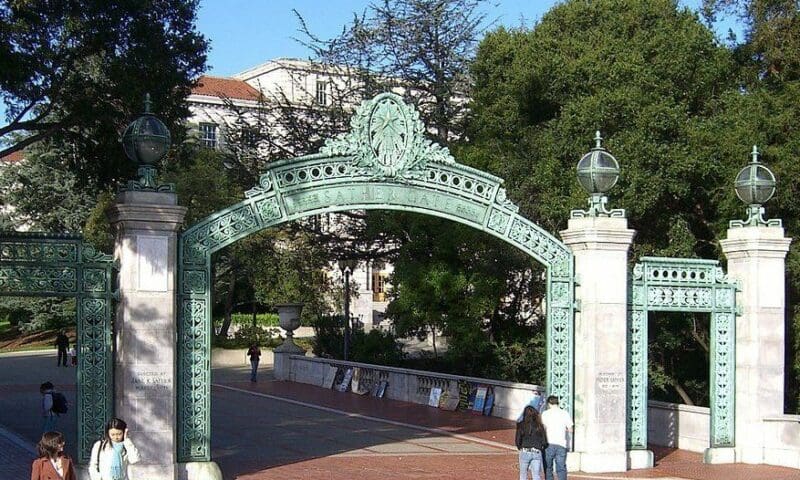

In the Public Interest is happy to be kicking off 2016 with good news. Pushed by students and workers, the University of California has announced it will divest from private prison companies such as Corrections Corporation of America (CCA) and the GEO Group.
This is yet another win for criminal justice reform—Columbia University divested from CCA last summer. The private corrections industry, which makes more profit when more people are in the system, is an obstacle to the changes many of us want to see.
The industry doesn’t want change. An executive with GEO Group, the second largest private prison operator in the U.S., recently boasted that the country would continue to “attract” crime. He shared the “good news” to investors: “The reality is, we are a very affluent country, we have loose borders and we have a bad education system.”
Private prison companies claim to do a better job more cheaply,
» Read more about: University of California Divests from Private Prison Industry »
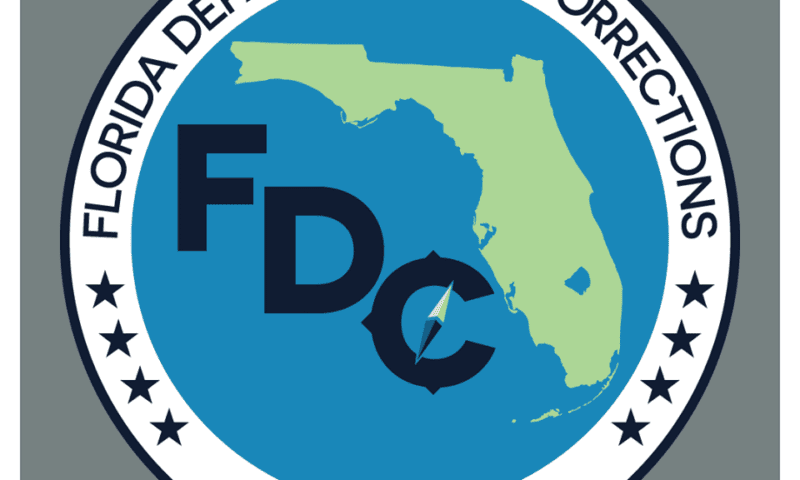

It’s unusual for a private contractor to terminate its own contract, especially a contract for $1.2 billion. But that just happened in Florida.
After two years of controversy, Corizon, America’s largest for-profit prison health care provider, just decided to end its care of 74,000 prisoners in the state. The company—which is owned by a private equity firm—says it is leaving because the contract terms aren’t flexible enough. But Corizon’s time in Florida has a familiar ring to it: understaffing, poor service and hundreds of lawsuits by prisoners.
Last year, 346 prisoners died in Florida prisons—the highest number in the state on record, even though the total number of prisoners has declined. Of those prisoners, 176 were listed with no immediate cause of death.
A recent state audit found nursing and staffing shortages, “notable disorganization” among medical records, and “life threatening” conditions.
» Read more about: Private Prison's Health Care: A Clear and Present Danger to Inmates »
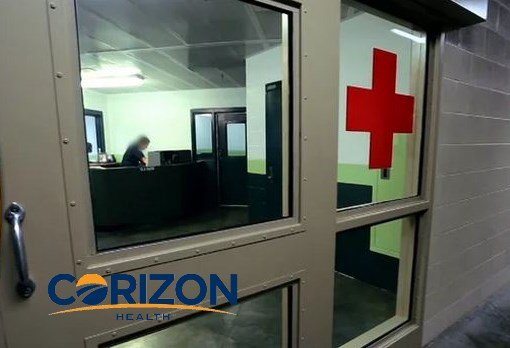

Two court orders and the most expensive wrongful death settlement in California history should be enough. But not for Corizon, a corrections health care company owned by a private equity firm.
For seven months earlier this year, Mario Martinez, a prisoner in Corizon’s care at the Dublin, California Santa Rita Jail, suffered from asthma that kept getting worse. A judge issued two court orders requiring the company to provide Mario urgently needed surgery, but they didn’t operate. While Mario suffered, Corizon even settled a lawsuit for $8.3 million with the family of a prisoner who, five years earlier at the same jail, had died in the company’s care.
In July, Mario suffered an asthma attack, collapsed in his cell and died.
Mario’s mother, Tanti Martinez, had hoped to bring her son’s story to Pope Francis, who on Sunday visited a Philadelphia jail that also contracts with Corizon.
» Read more about: Cruel and Unusual Punishment: Private Correctional Health Care »


Last week, in a powerful affirmation of the common good, commissioners in Tennessee’s Johnson County unanimously opposed the privatization of the state prison within their county’s limits. A response to fears that the state government could soon outsource management of the Northeast State Correctional Complex, the resolution reads like a checklist of what democracy and public control can provide a community.
The “no” vote was prompted by the state government’s recent exploration of outsourcing the management of state properties, including prisons, hospitals, parks and even the University of Tennessee. State officials have also been trying to manage a shortage of prison officers after introducing a controversial overtime policy statewide to cut costs.
But the Johnson County commissioners recognize that outsourcing isn’t the answer: “Any type of privatization would be detrimental to our county, citizens and staff of Northeast Correctional Complex.” They also honored public service by dedicating a day each year in recognition of the prison’s current staff.
» Read more about: Counties Say No to Privatizing Their Prisons »


As public officials across the country continue to manage shrinking budgets, experiments for funding public services are emerging. One new idea, the Social Impact Bond, has been advertised as a “win-win” for private investors and the public, but the reality is beginning to look a little different.
The results are in from the first SIB tried in the U.S. and it failed to meet its goals. The SIB was aimed at reducing the rate by which adolescents housed on Rikers Island returned to jail, with a goal of at least an 8.5 percent drop. Therapy was provided to inmates, but recidivism wasn’t significantly reduced.
SIBs are complex arrangements—private investors lend funding for a program and the government repays them only if certain goals are met. For the Rikers SIB, New York City was lent millions by Goldman Sachs, backed by Bloomberg Philanthropies.
Proponents of SIBs claim that,
» Read more about: Wrong Island: Why Are Privatizers Applauding Failed Prison Experiment? »


This week, the American Correctional Association (ACA) will hold its annual conference in Indianapolis, where thousands of government corrections officials, including wardens, jail administrators and sheriffs, will attend workshops and connect with their peers from across the country. Workshops include best practices for successful reentry programs for released inmates and working in corrections across generations.
But many workshops and events will feature a Who’s Who of private corrections companies, including Corrections Corporation of America (CCA), GEO Group, Aramark, Corizon and Telmate.
Those companies should be familiar—many have been prominent in reports we’ve released over the past few years detailing the suffering of inmates in private hands, such as thousands of medical malpractice claims and stories about maggots appearing in prison food.
On the eve of the ACA conference, we have released a new report revealing how such conferences allow corrections companies to influence government officials in ways outside the public’s oversight.
» Read more about: Politically Correctional: How Businesses Game Prison Conferences »
By now, you have probably heard about the riot at the for-profit Kingman Prison in Arizona. Days of unrest at the prison, run by the privately-held Management Training Corporation, left 15 wounded and forced nearly 1,000 incarcerated people to be transferred to other facilities. The same facility also suffered from a major riot in 2010. Similarly, people detained at an MTC-run camp in Texas names Willacy rioted earlier this year, forcing that facility to close completely.
The Kingman riots are focusing renewed attention on the Arizona legislature’s long, cozy relationship with the private prison industry. The repeated failings of for-profit prison operators have led Arizonans and the editorial board for the state’s largest paper to ask some big questions:
» Read more about: Questions Surround Private Prisons After AZ Riot »


Tristain Frye’s success in life is important not just to her – it’s important to all of us.
Frye, who recently worked on a new building at Gonzaga University in Spokane, WA, did not have an easy road to becoming a carpenter’s apprentice.
When she was 22, she was sentenced to 12 years in state prison. At that point, the odds were solidly against her.
That is until Tristain was accepted into an innovative pre-apprenticeship program in partnership with the Ironworkers, Laborers and Carpenters unions called TRAC: Trades Related Apprenticeship Coaching at the Washington Corrections Center for Women. Read about her in my article on the AFL-CIO blog, Jobs, Not Prisons: Unions Help Formerly Incarcerated Women Build a New Life.
The 16-week program is open to women in the prison who can prove themselves physically able to do the demanding work required in the construction industry: carry heavy loads of rebar,
» Read more about: Reducing Prison Populations One Job at a Time »


California voters passed a groundbreaking ballot measure this month that reduces penalties and sentences for nonviolent, “nonserious” crimes. Now, the private industry is responding to these changes in public attitudes and declining prison populations by opening up new lines of business.
A new report released by American Friends Service Committee (AFSC), Grassroots Leadership and the Southern Center for Human Rights, highlights the expansion of the private prison industry into other profitable and growing areas in the criminal justice system: prison and jail subcontracted medical care; forensic mental hospitals and civil commitment centers, as well as “community corrections” programs such as probation and halfway houses.
The report authors have named this new expanded private corrections industry the “treatment industrial complex” via the report.
As other states follow California’s lead and pass laws reducing mandatory minimum sentences, the report urges policy makers, advocates and others to ensure that private corporations can’t profit from any part of the criminal justice system.


Readers of Gary Cohn’s coverage of Proposition 47 and Donald Cohen’s report on the privatizing of America’s jails and prisons will be interested in two events held in sequence this weekend.
Saturday, October 25, 9 a.m.-1 p.m. East Los Angeles College, 1301 Avenida Cesar Chavez, Monterey Park. RSVP here



Introducing for-profit companies into America’s criminal justice system has been a bad deal for governments across the country.
During the past several years, a movement opposed to profit incentives in our criminal justice system has grown. Private prison corporations such as Corrections Corporation of America and GEO Group have come under increasing scrutiny and pressure for cutting corners, contracts that include “occupancy guarantees” of 80, 90 and even 100 percent, and unsafe prison conditions.
But it’s not just the prisons that are handed over to CCA or GEO Group. Almost every service delivered inside the prison is being outsourced to for-profit corporations. Outsourced inmate health care, food and commissary services, telephone and financial services like money transfers between families and inmates are all adding to the poor conditions in prisons and burdening inmates and their families with extra costs.
For example, earlier this month, the Palm Beach Post broke the story of the deplorable treatment of prisoners by health care contractors in Florida prisons as contractors seek to maximize profits by cutting costs.
» Read more about: For-Profit Corporations’ Prison Break-in »


When New York rapper Jay-Z played the Rose Bowl last summer, he surprised 90,000 concertgoers by making a political statement. Before launching into his hit “Hard Knock Life (Ghetto Anthem),” he urged fans to vote for a California ballot initiative that would dramatically reduce the state’s prison population and re-direct money into education and treatment programs.
“Prop 47, California! Build more schools, less prisons!” he exhorted.
A few weeks later, two other public figures delivered a similar rap, albeit in a different forum. In a Los Angeles Times op-ed piece, Newt Gingrich, the Republican politician, and B. Wayne Hughes Jr., a conservative Christian businessman, similarly urged Californians to end bloated spending on prisons and reverse tough-on-crime policies that they say have failed to significantly improve public safety. Among other things, Gingrich and Hughes pointed out that California now spends $62,396 per prisoner each year,
» Read more about: Three Strikes Reform: Proposition 47 and the Fight Against Inequality »


Detainees at the Northwest Detention Center, an immigrant detention center operated by GEO Group in Tacoma, Washington, initiated the first of repeated hunger strikes on March 7, 2014. A note from one of the hunger strikers passed to his lawyer read, “Please contact the local news. There’s 1,200 people not eating—better food, better treatment, better pay, lower commissary, fairness.”
The story of the hunger strikers is documented in a new report released by Grassroots Leadership and Justice Strategies detailing how immigrants detained in privately run detention centers across the country are routinely exposed to shocking levels of violence, sexual abuse, neglect, filth and wrongful death.
The report titled For-Profit Family Detention: Meet the Private Prison Corporations Making Millions By Locking Up Refugee Families, exposes how Corrections Corporation of America and GEO Group are both banking on a massive expansion to immigrant family detention.
» Read more about: Lowering the Bars for Humane Prison Conditions »


In a scene right out of Orange Is the New Black, 1,000 inmates at the Ohio Reformatory for Women in Marysville, Ohio dumped their food in protest last week after maggots were found in the kitchen and dining areas. The prison’s food service program had been outsourced to the massive Aramark corporation.
Maggots have also been discovered in seven other prisons around the state – and Aramark runs the food service programs in all of them. Last month, maggots were discovered in two Michigan prisons where Aramark also runs the food service programs. The Philadelphia, PA-based corporation hasn’t taken responsibility, and officials in both states are sticking by the vendor, responding with small fines instead of canceling the contracts. Ohio fined Aramark $270,000 and Michigan Governor Rick Snyder fined the company a mere $200,000.
» Read more about: Outsourcing: Maggots on Aramark’s Prison Menu »

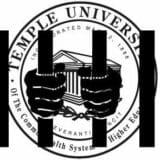
Whenever I hear something that sounds a little fishy, I always follow my mom’s advice to consider the source. So when two professors from Temple University touted a study praising the quality and cost effectiveness of private prisons, advocates wanted to know who funded it. Not surprisingly, it turned out that the private prison industry paid for the study, a fact conveniently missing from the professors’ early draft and media appearances.
In the Public Interest’s friend and colleague Alex Friedmann, managing editor of the monthly Prison Legal News and associate director of the Human Rights Defense Center, filed an ethics complaint with Temple University. In addition, ITPI and 15 other organizations demanded that Temple conduct an ethics review.
In response, Temple University has disassociated itself from the study. In addition, the methodology behind the study has also been called out for being misleading and its conclusions for being inaccurate.


The U.S. prison population has grown more than 700 percent between 1970 and 2009. We’re locking people up left and right, including thousands of non-violent immigrants whose only crime is crossing the border without documentation. They are now trapped in private prisons with no voice.
The American Civil Liberties Union (ACLU) has just released the jaw-dropping findings of its investigation into the shadowy system of privately run Criminal Alien Requirement (CAR) prisons used to hold immigrants. Here, thousands of immigrants serve lengthy prison sentences where they are exposed to abysmal conditions.
Private prisons have a lot to gain from the incarceration of immigrants. Their business model revolves around imprisoning people for profits, siphoning tax dollars away from public goods and into shareholders’ pockets. For locked-up immigrants, however, it means being isolated from family and the outside world.
Until ACLU’s blockbuster investigation, CAR facilities have operated in the shadows,


As the saying goes, it takes a village. And when corporations spend vast resources to gain control of public services, it takes a village of smart, savvy and nimble people and organizations to beat them back. That’s exactly what happened in Arizona this week.
Last Friday, Arizona House Appropriations Chairman John Kavanagh snuck $900,000 into the state budget earmarked for GEO Group, the nation’s second largest private prison company. That amount was above and beyond the $45 million GEO already rakes in from Arizona taxpayers. Interestingly, the Arizona Department of Corrections did not request the increase. According to the Arizona Republic, GEO’s lobbyists worked directly with Kavanagh, who, when asked to justify the earmark, said simply that GEO “wants to get more money.”
Private prison critics quickly sprang into action. The American Friends Service Committee and Human Rights Center helped lead a strong coalition that included the American Civil Liberties Union,
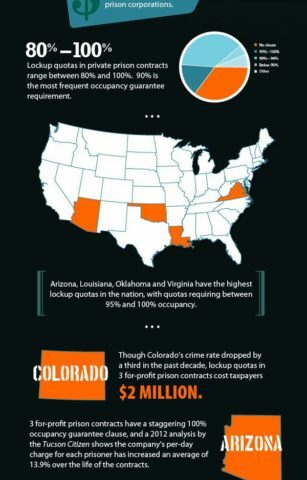
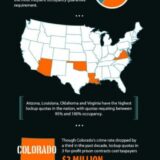
Today In the Public Interest released a report titled Criminal: How Lockup Quotas and “Low-Crime Taxes” Guarantee Profits for Private Prison Corporations.
The study documents the shocking prevalence of contract language between private prison companies and state and local governments that guarantee prison occupancy rates, which can accurately be described as “lockup quotas.”
If the quota is not met due to lower crime rates and a falling prison population, taxpayers are forced to pay for empty beds in what essentially amounts to a “low-crime tax” on communities.
Lockup quotas can have broad negative implications beyond obvious financial concerns and should be prohibited in any private prison contract. See report infographic below and the report here.
The more people are aware of lockup quotas the more we as a community are empowered to prevent this type of predatory language from existing in private prison contracts —
» Read more about: Stop Prison Inc. from Pushing Lockup Quotas »
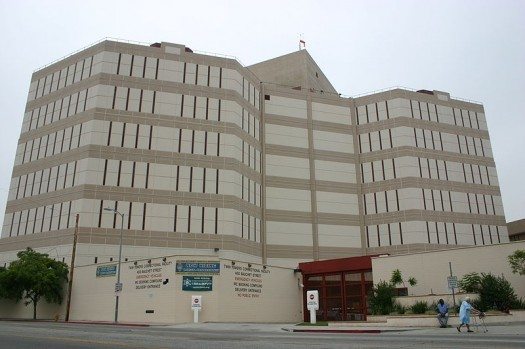

With jails straining to absorb thousands of prison inmates, jailhouse guard-on-inmate beatings grabbing headlines, and public concern rising about possible spikes in crime rates, public safety issues—especially around the massive Los Angeles County jail and probation systems—have Angelenos of all stripes scrambling for answers.
The just-concluded three-part, “Smart Justice: Rethinking Public Safety in California” discussion at the University of Southern California, capped off with a fourth session at the Pat Brown Institute, brought together key leaders—from top L.A. County public safety managers to heads of organizations charged with monitoring those systems—to identify often well-known problems, but also to propose potential solutions, cures that generally involve replacing “punishment” with “rehabilitation” in corrections thinking.
A Combustible Environment
“Los Angeles County has the largest probation department in the nation, the largest sheriff’s department, and the third largest police force in the L.A. Police Department,” said Alex Johnson from the Office of County Supervisor Mark Ridley-Thomas.
» Read more about: Facing Los Angeles’ Incarceration Dilemma »